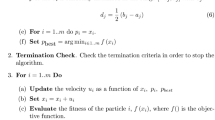Abstract
Pure Adaptive Search is a stochastic algorithm which has been analyzed for continuous global optimization. When a uniform distribution is used in PAS, it has been shown to have complexity which is linear in dimension. We define strong and weak variations of PAS in the setting of finite global optimization and prove analogous results. In particular, for then-dimensional lattice {1,⋯,k}n, the expected number of iterations to find the global optimum is linear inn. Many discrete combinatorial optimization problems, although having intractably large domains, have quite small ranges. The strong version of PAS for all problems, and the weak version of PAS for a limited class of problems, has complexity the order of the size of the range.
Similar content being viewed by others
Explore related subjects
Discover the latest articles and news from researchers in related subjects, suggested using machine learning.References
S.H. Brooks, “A discussion of random methods for seeking maxima,”Operations Research 6 (1958) 244–251.
D. Dueck and T. Scheuer, “Threshold Accepting: a general purpose optimization algorithm appearing superior to simulated annealing,”Journal of Computational Physics 90 (1990) 161–175.
M.R. Garey and D.S. Johnson,Computers and Intractability: A Guide to the Theory of NP-completeness (Freeman, San Francisco, CA, 1979).
J.G. Kemeny and J.L. Snell,Finite Markov Chains (Springer, New York, 1976).
N.R. Patel, R.L. Smith and Z.B. Zabinsky, “Pure adaptive search in Monte Carlo optimization,”Mathematical Programming 43 (1988) 317–328.
Z.B. Zabinsky and R.L. Smith, “Pure adaptive search in global optimization,”Mathematical Programming 53 (1992) 323–338.
Author information
Authors and Affiliations
Additional information
The authors would like to thank the Department of Mathematics and Statistics at the University of Canterbury for support of this research.
Rights and permissions
About this article
Cite this article
Zabinsky, Z.B., Wood, G.R., Steel, M.A. et al. Pure adaptive search for finite global optimization. Mathematical Programming 69, 443–448 (1995). https://doi.org/10.1007/BF01585570
Received:
Revised:
Issue Date:
DOI: https://doi.org/10.1007/BF01585570




